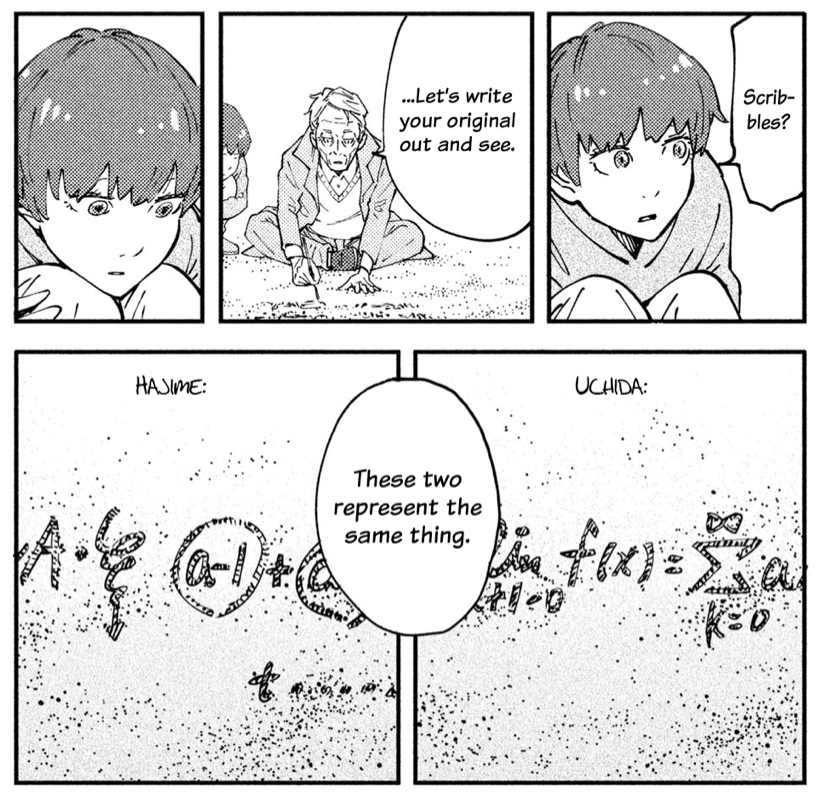
a list compiled by Alex Kasman (College of Charleston)

a list compiled by Alex Kasman (College of Charleston)
| Home | All | New | Browse | Search | About |
| ... |
|
| ... |
| A bitter old mathematician discovers a young prodigy while visiting the little Japanese island where he grew up in this ten volume manga series that ran from 2017-2020.
Uchida Yutaka is a mathematician who stopped doing research and became a popular TV personality, like a mathematical version of "Bill Nye the Science Guy". However, his fame has not brought him happiness as he feels he has lost the joyful connection that he used to have with mathematics. He gets angry and walks out of a talk he is giving at the new school on the isolated island where he grew up. Without even realizing where he is going, he ends up at the ruins of the school he used to attend where the formulas he scribbled on a wall are still there...but someone has been adding to it, someone Yutaka can tell is truly brilliant. He is shocked to discover that the "genius" is just a fifth grader, Sekiguchi Hajime. Unlike Yutaka, Hajime still loves math, and he wants to use it to understand the world around him, coming up with formulas describing natural phenomena (clouds, insect wings, etc.) and discovering Kaprekar's constant by playing around with license plate numbers. It is, of course, nice to see math presented as something useful, a sign of intelligence, and something that a person can love. But, this manga also includes lots of stereotypes that I believe misrepresent mathematics and have negative consequences. Both Yutaka-san and Hajime-kun are anti-social in their own ways. (The old man is mean and crabby, while Hajime is so wrapped up in math that he mostly ignores the people around him, appearing almost autistic.) And, they are both male while the primary female characters (at least in Volume One) are Hajime's loving mother and an older friend who wants to be an "Idol", both of whom keep saying that they don't know anything about math. (There are a few female mathematicians included in a crowd that are intended to represent the famous mathematicians of the past.) The idea that only young people can do math is repeated several times. And, of course, the whole idea of the story is that there are a few "geniuses" for whom math comes easily and the rest of us simply can't compete. Each of these stereotypes, I would argue, represents at least an extreme exaggeration of the truth if not an outright falsehood, and together they have the effect of discouraging people from learning and pursuing mathematics as a career and area of study. That doesn't mean I didn't enjoy reading this manga. I did! I just wish it had avoided these generalizations and misrepresentations. Thanks to Chu-Wee Lim for letting me know about Hajime's Algorithm! Currently, the first volume (the only one I've read) is available for free in English here.

|
| More information about this work can be found at mangadex.org. |
| (Note: This is just one work of mathematical fiction from the list. To see the entire list or to see more works of mathematical fiction, return to the Homepage.) |
| |||||||||||||||||||||||||
| Home | All | New | Browse | Search | About |
Exciting News: The 1,600th entry was recently added to this database of mathematical fiction! Also, for those of you interested in non-fictional math books
let me (shamelessly) plug the recent release of the second edition of my soliton theory textbook.
(Maintained by Alex Kasman,
College of Charleston)